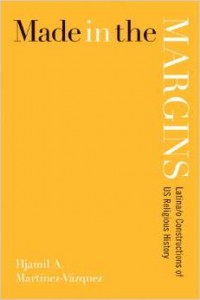Hjamil Martínez-Vázquez, independent scholar and online instructor in the field of religious history, describes how the linear construction of U.S. religious historiography, because it assumes that it conveys a universal view of history, leaves out the voices of those who are at the margins of society. The author proposes a need for counter-discourses that deconstruct the normative discourse and that unveil the silenced voices of the subaltern, including Latinas/os. For the writing of U. S. Latina/o histories, Martínez-Vázquez suggests the use of lived religion and feminist history from a postcolonizing perspective. These theories and methodologies can help in the decolonization process of the traditional U.S. religious historical discourse. They are also useful in the construction of a Latina/o discourse that highlights the historicity of Latina/o experiences. Thus, Martínez-Vázquez argues that we need to decolonize the Latina/o mind in order to recover the memory of our stories and experiences.
The book consists of an introduction, three main parts, and a conclusion. Part I takes a look at U.S. religious historiography and the canonical status of its colonial, Protestant-Puritan discourse. Part II considers the liberationist approach of Latina/o religious historiography. In it, chapter 3 focuses on Catholic religious history and its focus on the Church, whereas chapter 4 discusses Protestant historiography and its focus on the community.
In Part III, the author suggests theories and methodologies from a postcolonizing perspective that can challenge the standard historiographical discourse. Chapter 5 considers what the author means by postcolonizing criticism and its function in the construction of subaltern histories. Chapter 6 focuses on lived religion. The last methodological suggestion given is the use of feminist history, explained in chapter 7. In the conclusion, Martinez-Vázquez discusses the importance of conocimiento in this process of decolonization of history.
Martínez-Vázquez offers the reader an honest and straightforward assessment of U.S. and Latina/o religious history, even highlighting the Latina/o biases and limitations in order to establish a decolonized U.S. religious historiography. He not only critiques the dominant voices of U.S. religious historiography, he also warns the marginal voices, especially Latina/os, of the dangers of being caught in the trap of dualistic ways of establishing identity as the normative discourse has taught subalterns to do so. Martínez-Vázquez does not sugarcoat the realities that Latina/o historians face as part of this process. One example of this is when he acknowledges that the colonial binaries and other manifestations of its discourse are not destroyed despite the challenge of postcolonializing critique.
Made in the Margins is a useful book addressed to readers knowledgeable on the subject of postcolonial studies. It does not define key terms such as dis-cover and subaltern (which he does in his earlier essay “Dis-covering the Silences: A Postcolonial Critique of U.S. Religious Historiography,” in New Horizons in Hispanic/Latino(a) Theology, Cleveland: The Pilgrim Press, 2003).
Lutheran School of Theology at Chicago




